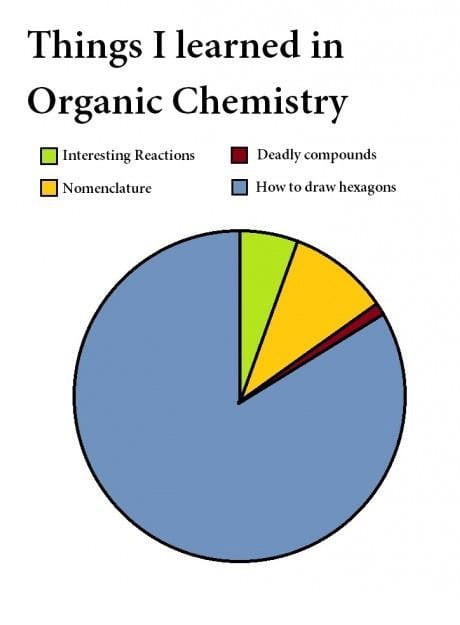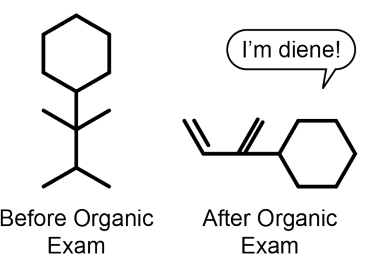Organic chemistry (AKA “o chem”) is known to be one of the most challenging classes any chem/bio undergrad and pre-health professional needs to take. One of the main reasons why I immediately hated o chem was because everyone around me and their best friend hated o chem. O chem is known as that subject that many premeds (students on the path to applying to medical school) struggle in, or as the class that sifts out the “lesser” premeds from the “more worthy” ones. THIS IS A LIE!
Organic chemistry does not have to be the worst class you’ve ever taken, it’s all in your hands. Unfortunately I had to learn this lesson the hard way during my first quarter of organic chemistry at UWB. I thought I would share a few things I learned about how to approaching studying organic chemistry (a few may even be applicable to other classes) as well as some silly o chem memes that might make any o chem student laugh.
Before I get into the tips, I’ll give a very brief explanation of what organic chemistry is for those who have not heard of it before. Organic chemistry is a subdivision of chemistry which deals with organic reactions and the paths one might take to “creating” them (building them). Organic compounds are any that contain the carbon atom. The carbon atom is very unique because it is very particular when it comes to bonding, carbon loves having four bonds, because of this special property many reactions are possible. Carbon is found all throughout living things, we are made of almost 99% carbon, it’s so important that we’ve dedicated an entire year/series of classes to just reactions involving it. As you can imagine, organic chemistry plays a very big role in understanding what happens inside of as well as around us (which is why I imagine it is on the MCAT and why medical and dental schools would want their incoming students to have taken the class/series).
And now… Here are a few tips I came up with that helped me be a better o chem student:
- Make a list – of the topics you learned and of those you still don’t understand. This helped a lot when if came to studying. I like to look at lists and check things off as I go along my studying, so that I can focus on other topics that I may not understand as well.
- PRACTICE!! – Don’t be lazy, just do it. Over and over and over again. It will get tiring and repetitive and you might want to scream a little after practicing so many mechanisms (the step by step sequence of basic/elementary reactions by which overall chemical change occurs), but it’s one of the best ways to understand and improve your abilities with the topic.
- Change your perspective – I often felt like there was no point to taking this class. Why am I taking this weird class when in reality all I want to do is be a doctor and help my patients with any concerns they may have? I didn’t realize that organic chemistry would actually change my way of thinking, studying, and problem solving. If you compare organic chemistry to medicine, they’re both a little similar in the sense that (once you get past all the memorization of reactions) you’re constantly solving puzzles and applying everything you know to get an answer.
- Look for help – your professor is there to help you! Don’t be afraid to reach out to them or attend their office hours, professors LOVE it when students do this. Or, find a few students you work well with and study in a group, this has worked amazingly well for me. Visit the QSC (Quantitative Skills Center) for particularly tricky problems or questions you may have, they have tutors there who are students that previously took the class and understand what you’re going through.
Organic chemistry can be a very overwhelming topic because there is so much to learn, but it all comes down to how you’re teaching yourself the topics and your organization with it. Make the most of your studying by focusing on synthesis (Organic synthesis is a special branch of chemical synthesis and is concerned with the intentional construction of organic compounds via organic reactions, or in English… synthesis is really a bunch of organic reactions that when properly put into a specific order will yield a desired organic product compound(s)) problems. Better yet, make up your own synthesis problems or change just a small part of it (one additional double bond can make a HUGE difference)! I’m happy to say after almost completing the entire o chem series (I’m currently taking o chem 3), that o chem is manageable, and it’s changed the way that I study and even approach problems. Organic chemistry is very visual and should involve you drawing out the compounds and any ideas you might have for solving a retrosynthetic problem (reverse of synthesis).
Thousands of students before you have been able to pass the class, although o chem may seem like it’s the end of a good GPA, you’ll feel amazing once you’re finished with it! Happy studying to all the o chem students out there!
…the o chem memes!




I’m currently in this class and it just started this semester. I’m terrified! I did very well in gen chem but I feel like I’m stressing I’ll be bad at this. Thanks for the advice. I will definitely be meeting with my professor during office hours! She told the entire class that she loves when students do that.
So glad you like the article and found it helpful! Thanks for reading.